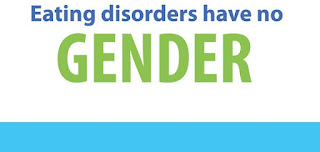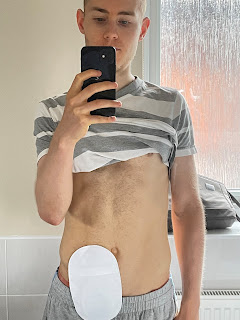Yep, Men Get Eating Disorders Too
If you were to say to society "what is an eating disorder?" despite the awareness campaigns and work that has been done, I can guarantee the majority response will still be along the lines of "an underweight, white, teenage girl".
Whilst it is true that this demographic does sadly suffer from eating disorders, it is far from the whole story.
When I started struggling aged 11, I can honestly say I had never known of a man with an eating disorder. Nor, it seems, had any of the medical professionals who denied me support and basically gaslit me for many years, ignoring what was really going on because "Men don't get eating disorders, right?"
Wrong... so wrong.
The UK Eating Disorders charity Beat estimates that 25% of sufferers are male. Personally, I think this is a bit of an underestimate, but the truth is we just don't know. We don't know the true numbers of eating disorders full-stop due to stigma, misunderstandings, ignorance and an ingrained diet culture; knowing the number of men who struggle is even harder because often it goes under the radar, and men are often even more reluctant to admit they're not okay.
Before I continue, I want to be 100% clear... eating disorders care is not adequate for all ages, all genders and all demographics. It is not just a male issue, but I will be focussing on being a man and the stigma I've faced. This is - in no way - to belittle the experiences of any other gender identity.
Over the years, stigma has affected me in more ways than I care to mention.
When I was playing semi-professional level football, there was an incessant focus on fitness, performance and building muscle to create the "right" physique. I was the subject of "banter" from teammates for my slim build, told I need to "eat more" and "work out". This undoubtedly had some influence on my exercise addiction developing and taking hold.
Fast forward to age 18, when I was under crisis services. I finally had some hope that I would get some help. I had just been in hospital severely unwell, surely they'd help? Nope.
"We've never had a man in our service before, so we don't really know what to do. You're our Guinea Pig!" Safe to say I didn't find that joke very funny, and 6 months later I was discharged because I didn't fit their funding criteria. If someone who has just been hospitalised with severe physical complications doesn't fit criteria, then I hate to think how bad things have to get in order to fit!
But I'd honestly say the worst part of being a man with an eating disorder is the lack of knowledge of the medical profession.
My eating disorder developed at the worst time for my development. But what no doctor picked up was the effects that was having on my body, on my development and potentially on my future. I didn't grow or develop for 4 years between the ages of 11 and 15. I didn't develop at all. These two pictures are taken 4 years apart. Guess which one I'm older in... I can't and they're pictures of me.
Why did no Medical Professional notice?
I think the answer is simple. When we look at eating disorders questionnaires (which by the way are wholly inadequate, but that's another conversation), it always asks "for women, have you lost your periods?" (or similar).
But where is the question for men, "Have you lost your morning erections", "Have you lost sexual desire" or similar? I had ZERO Testosterone for 4 years, and then for another 2 years aged 17. I had to diagnose myself.
How has this affected my life?
Well, I don't know if I will ever be able to have children (if I want to one day), I may have to take medication for the rest of my life which has side-effects, and I have never grown to my full height or fully developed as an adult. I am permanently stuck in a teenager's body. I'm going to do a future blog on this in more detail, but this is probably the worst side of being a man with an eating disorder, and sadly I don't think much has changed in the last 14 years.
Also, I believe - and this is now backed up by evidence - that eating disorders in men can become physically serious at different times than it does for women. BMI is a useless criteria anyway, but the "trigger point" to access treatment might mean men may become more severely unwell before they trigger that point. There are probably lots of complex reasons for this, and I hope one day research catches up the reality.
Finally, I think there is a huge, unseen and unheard problem with eating disorders in men, and that is Gym Culture. I am by no means saying everyone at the gym has an ED, but I think too often behaviours and thoughts which are disordered get masked by the guise of "Health" and "Aesthetics". It is almost encouraged within society.
Masculinity (or society's view of it) is simply toxic to all genders. And I believe it has a knock on effect for men, actively harming them and encouraging eating disorders and disordered behaviours.
If we really want to support men with eating disorders, I truly believe that we need to start working on toxic masculinity, patriarchy and support men in embracing themselves, finding out who they truly are and, most importantly, we HAVE to end the stigma that men don't get eating disorders. They do, and actually they don't differ that much to eating disorders in any other gender! They are just as serious, and they need more recognition, research and support.





thanks for sharing your story
ReplyDelete